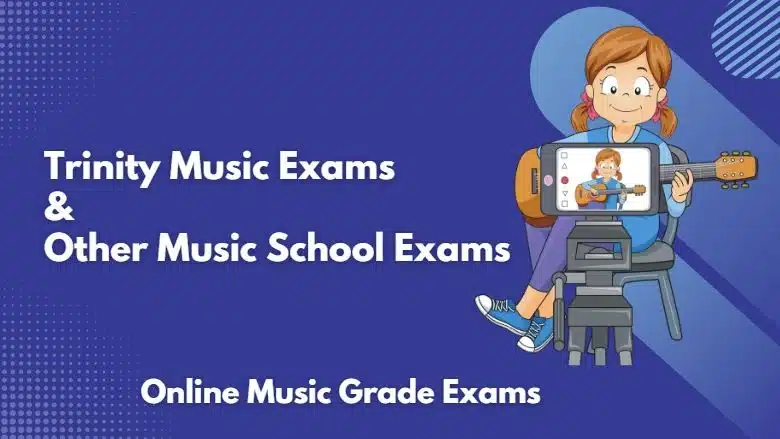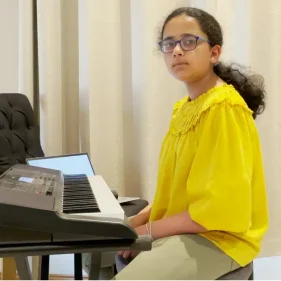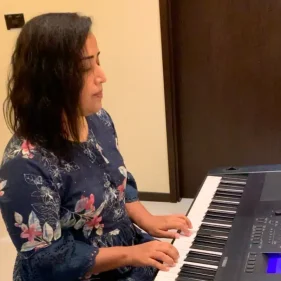Many of us would have heard musicians saying that they are preparing for Trinity Music Exam or other music grade exams like Rockschool or ABRSM. In this article let us explore what is Trinity Music Exam or other equivalent music school exams.
Music grade exams are a great way to assess your musical progress and development. They can help you set goals, track your progress, and identify areas that need improvement. The music grade exams offer an opportunity for students to get international certification. They expose them to a range of music that they might not be familiar with. Therefore, they broaden their musical horizons.
How far along are you in the process of preparing for your music grade exams? For many people, this is a time of both excitement and anxiety. There are many benefits to taking music grade exams, regardless of your skill level. This blog post will discuss the benefits of music grade exams and how they can help you achieve your musical goals. So keep reading for some helpful tips! So I hope you find this article helpful, whether you are a music student, teacher, or music parent.
What are the music exam boards?
The music exam boards are some of the most respected and well-regarded worlds. Students who wish to study music at the highest level often choose to take their exams with one of these boards.
There are four main music exam boards: The Associated Board of the Royal Schools of Music (ABRSM), Trinity College London, LCM (London College of Music)and Drama, and RSL (Rockschool). Each BoardBoard has its strengths and weaknesses, so it’s essential to choose the right one for your individual needs.
The Associated Board of the Royal Schools of Music (ABRSM)
ABRSM is a music education body based in the United Kingdom that provides examinations in musical theory, musical instrument performance, and grades for pieces of music. It is one of several examination boards operating in the UK and is an international authority on musical assessment.
Frederic Austin OBE (1872-1941) founded ABRSM IN 1889. At the London home of Sir George Grove (1820-1900), famous as a writer on music and as the editor of Grove’s Dictionary of Music and Musicians. The Board initially focused on grade examinations for violin, piano, organ, cello, and voice; it later added more instruments to its repertoire. In 1898, ABRSM launched its first international examinations.
ABRSM examinations are available in more than 90 countries. The organization offers a wide range of examinations and assessments for music students of all ages and abilities. ABRSM’s music examinations have three main sections: practical, theory, and aural.
The practical section assesses a candidate’s performance on their chosen instrument or voice. The theory section covers music rudiments, such as notation, harmony, and counterpoint. The aural section tests a candidate’s musical perception and ability to identify different sounds, rhythms, and tonalities.
ABRSM music examinations open up a world of opportunities for music students.
Trinity College, London
Trinity College London is an international music education body that offers examinations and assessments in over 60 countries worldwide. Revd Henry George Bonavia (1840-1907), a music teacher and examiner founded this in 1877. They saw the need for a music examination system that was fair and accessible to all.
Trinity’s music examinations have four main sections: practical, music theory, music history, and aural. The aural section assesses a candidate’s musical perception and ability to identify different sounds, rhythms, and tonalities.
Theory examinations cover harmony, counterpoint, analysis, and musicianship. Trinity offers both written and oral theory examinations at a variety of levels. Practical examinations encompass various instruments, from piano and violin to voice and guitar. Students can take either performance or technical examinations or both. The Performance examinations test a candidate’s ability to perform music from a specific repertoire. The technical examination assesses a candidate’s technique, scales, and arpeggios. The Sight-reading & Aural section assesses a candidate’s musical perception and ability to identify different sounds, rhythms, and tonalities.
LCM (London College of Music) and Drama
The London College of Music (LCM) is an international music education body that offers examinations and assessments in over 60 countries worldwide. Revd Henry George Bonavia (1840-1907), a music teacher and examiner founded this organization in 1887. They saw the need for a music examination system that was fair and accessible to all.
The London College of Music (LCM) offers a range of examinations in music, ranging from beginner to diploma level. The LCM exams are graded on a scale from 1 (beginner) to 8 (highest level), with eight equivalent to an A* grade. Exams are available in various musical disciplines, including classical music, jazz, popular music, and world music.
RSL (Rockschool)
The exams in Rockschool are graded on a nine-point scale, with nine being the highest and one being the lowest. The grades awarded in each of the five performance areas (vocals, guitar, bass, drums, and keyboard) are averaged to give the student’s final grade for the exam.
Rockschool offers exams at four different levels: beginner, intermediate, advanced, and diploma. Each level has its syllabus, which specifies the skills and knowledge that a student is expected to have mastered by that level. There is also a set of Specimen Papers available for each grade that students can use to test their understanding of the material and practice taking exams.
The RSL grade exams are designed to test students’ knowledge and skills in music performance, theory, and sight-reading. The examinations are offered at eight levels, from Grade One to Grade Eight.
Among the topics covered in Grade One are music notation, tempo, and melody, among others. Harmony and the basics of improvisation are introduced in Grade Two, building on the foundation laid in Grade One. In grade three, music history and analysis become more prominent. In Grade Four, students learn more advanced improvisational skills. Music from a variety of genres and styles is introduced to students in Grade Five. Orchestration, composition, and music technology are all part of the Grade Six exam. Candidates for Grade Seven are expected to have a thorough understanding of all aspects of music. RSL offers a music examination up to Grade Eight. If a candidate has passed grade eight, they are considered knowledgeable in their field. A candidate is judged as knowledgeable in their field if they pass grade eight.
How can you prepare for Music grade exams?
You can do a few things to prepare for a music grade exam.
- In order to prepare for a test, familiarise yourself with the knowledge base.
- If you take a theory exam, be familiar with the terms and concepts covered.
- Third, practice, practice, practice! A music grade exam is not something you can wing. Make sure you put in the time to practice and perfect your skills.
Finally, you can always consult a music teacher or tutor if you want further guidance. They will be able to help you with specific questions and give you tips on how to best prepare for your music grade exam.
How to give Music Grade Exam?
You can give music exams both offline and online. For offline process you will have to contact your local music school. For online you can give music from the comfort of your home. You have to record the entire performance as a video, shot in single take. Then the video exams are uploaded in the respective music school and the examiner marks the video and the scores are informed in about 2-4 weeks. You can get more details about the exam in Music Grade Exams.
What are the benefits of taking music exam or other music school exams?
Taking music grade exams can have several benefits.
- First, they can help you to gauge your progress as a musician. You can get an objective measure of how far you have come and what level you are currently at by taking an exam.
- Secondly, music grade exams can help to motivate you to keep practicing and progressing. The prospect of taking an exam can be a great motivator to practice more and get better.
- Third, music grade exams can give you a sense of accomplishment. By bypassing an exam, you can feel proud of your achievements and feel confident in your abilities.
- Fourth, music grade exams can open up new opportunities for you. For example, suppose you are looking to study music at a higher level. In that case, many colleges and universities will require you to take music grade exams as part of the admissions process.
So, if you are thinking of taking a music grade exam, there are many good reasons to do so. Don’t forget to set yourself up for success.
What should you do if you don’t pass a Trinity music grade exam?
If you don’t pass a music grade exam, there are a few things you can do.
- First, don’t panic. It’s not the end of the world.
- Secondly, take a look at what went wrong and identify where you need to improve. Did you not practice enough? Are there certain concepts you need to review?
- Third, set a new goal and try again. Make a plan of action and commit to putting in the work. With hard work and dedication, you can achieve anything you set your mind to.
- Fourth, seek out help if you need it. If you are struggling to improve on your own, consider getting a music tutor or taking music lessons. A good music teacher can make all the difference.
- Finally, pursue your passion and never give up on your music career.
So, if you don’t pass a music grade exam, don’t despair. Just pick yourself up and try again. With a little bit of effort, you can achieve anything you set your mind to.
Conclusion
Consider taking music grade exams to challenge yourself and take your playing to a new level. Graded exams can provide motivation, feedback, and direction, which are essential for musical growth. Talk to your music teacher about enrolling in an exam program – they will be able to guide you through the process and help you find the right level of examination for your current playing ability. Are you ready to take your playing to new heights? Share your thoughts with us.
























